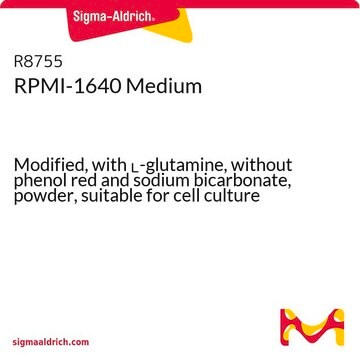R1383
RPMI-1640 Medium
With ʟ-glutamine, without glucose and sodium bicarbonate, powder, suitable for cell culture
Synonym(s):
Roswell Park Memorial Institute 1640 medium
About This Item
Recommended Products
Product Name
RPMI-1640 Medium, With L-glutamine, without glucose and sodium bicarbonate, powder, suitable for cell culture
form
powder
technique(s)
cell culture | mammalian: suitable
components
L-glutamine: yes
phenol red: yes
sodium pyruvate: no
HEPES: no
NaHCO3: no
shipped in
ambient
storage temp.
2-8°C
Looking for similar products? Visit Product Comparison Guide
General description
Application
Quantity
Reconstitution
also commonly purchased with this product
supplement
Storage Class Code
13 - Non Combustible Solids
WGK
WGK 1
Flash Point(F)
Not applicable
Flash Point(C)
Not applicable
Choose from one of the most recent versions:
Certificates of Analysis (COA)
Don't see the Right Version?
If you require a particular version, you can look up a specific certificate by the Lot or Batch number.
Already Own This Product?
Find documentation for the products that you have recently purchased in the Document Library.
Customers Also Viewed
Our team of scientists has experience in all areas of research including Life Science, Material Science, Chemical Synthesis, Chromatography, Analytical and many others.
Contact Technical Service





